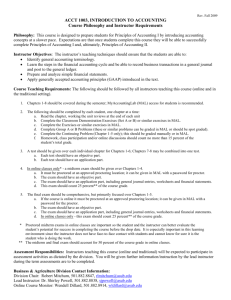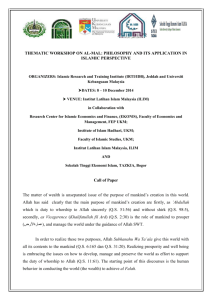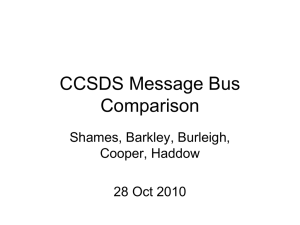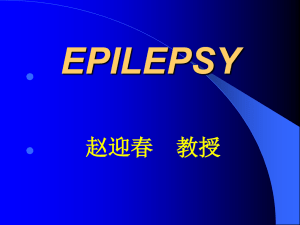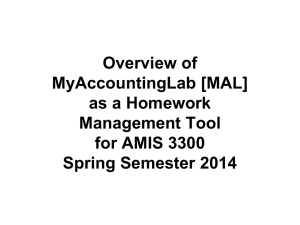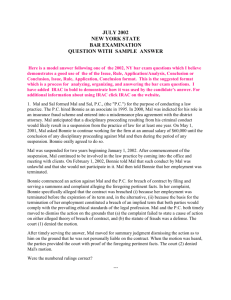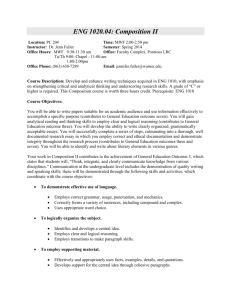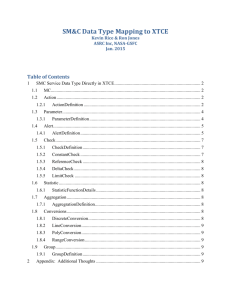Chapter 2 – Building Blocks of Managerial
advertisement
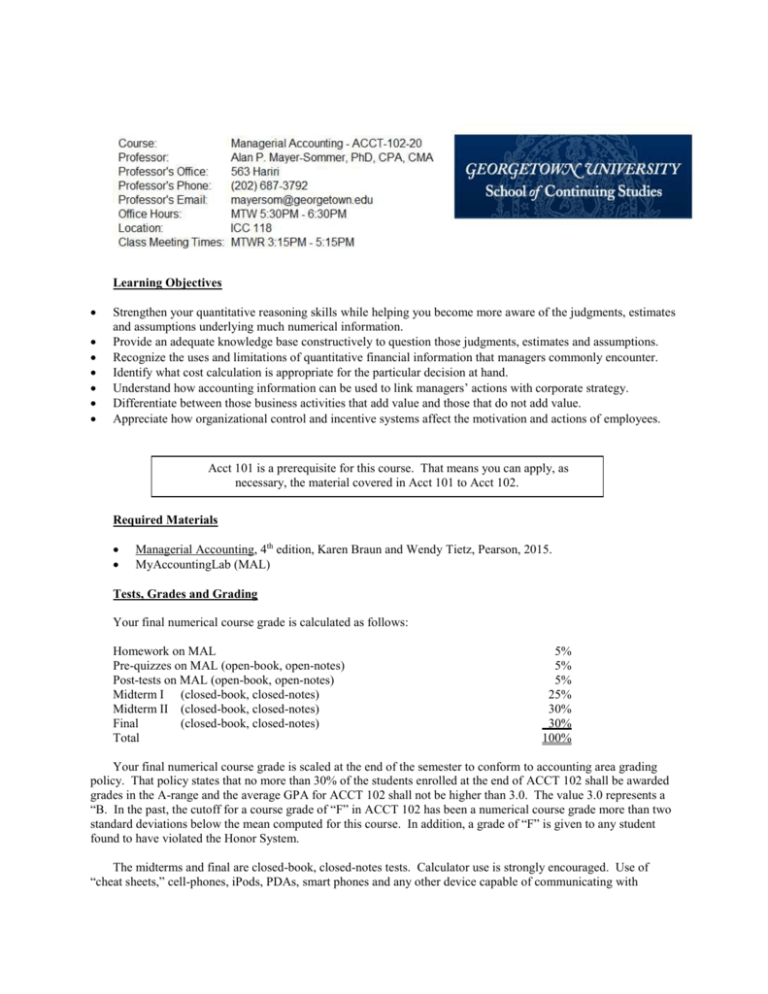
Learning Objectives Strengthen your quantitative reasoning skills while helping you become more aware of the judgments, estimates and assumptions underlying much numerical information. Provide an adequate knowledge base constructively to question those judgments, estimates and assumptions. Recognize the uses and limitations of quantitative financial information that managers commonly encounter. Identify what cost calculation is appropriate for the particular decision at hand. Understand how accounting information can be used to link managers’ actions with corporate strategy. Differentiate between those business activities that add value and those that do not add value. Appreciate how organizational control and incentive systems affect the motivation and actions of employees. Acct 101 is a prerequisite for this course. That means you can apply, as necessary, the material covered in Acct 101 to Acct 102. Required Materials Managerial Accounting, 4th edition, Karen Braun and Wendy Tietz, Pearson, 2015. MyAccountingLab (MAL) Tests, Grades and Grading Your final numerical course grade is calculated as follows: Homework on MAL Pre-quizzes on MAL (open-book, open-notes) Post-tests on MAL (open-book, open-notes) Midterm I (closed-book, closed-notes) Midterm II (closed-book, closed-notes) Final (closed-book, closed-notes) Total 5% 5% 5% 25% 30% 30% 100% Your final numerical course grade is scaled at the end of the semester to conform to accounting area grading policy. That policy states that no more than 30% of the students enrolled at the end of ACCT 102 shall be awarded grades in the A-range and the average GPA for ACCT 102 shall not be higher than 3.0. The value 3.0 represents a “B. In the past, the cutoff for a course grade of “F” in ACCT 102 has been a numerical course grade more than two standard deviations below the mean computed for this course. In addition, a grade of “F” is given to any student found to have violated the Honor System. The midterms and final are closed-book, closed-notes tests. Calculator use is strongly encouraged. Use of “cheat sheets,” cell-phones, iPods, PDAs, smart phones and any other device capable of communicating with 2 someone else or over the internet is prohibited. During a test, you may not access any resource or communicate in any way with any person other than a proctor, instructor, medical or security professional. Students with prior certification from the Learning Center will receive the accommodations specified in the letter furnished by the Academic Resource Center. Grades on each test are determined using a template that is applied uniformly to all students. The grading template is presented below: If you miss a midterm and have a valid excuse, the next midterm or the final will also count for the missed exam. You must take the final exam. 3 Cautionary Note About MyAccountingLab (MAL) Assignments MyAccountingLab deadlines are firm. It is your responsibility to check the syllabus so you know (1) what needs to be submitted and (2) when those submissions are due. No credit is given for late submissions. Allow extra time for the unexpected. Allow for unexpected events such as hardware, software and transmission failures. Completing a particular MAL assignment may take longer than planned. Allow for these and other eventualities by completing assignments with plenty of time to spare. You can access self-help online at 247pearsoned.custhelp.com. If you have gotten an error message, cut and paste that message into the self-help search window and you will receive search results for the issue. You can also call Tech Support at (844) 292-7015 or (800) 677-6337 but do so allowing plenty of time to resolve any technical issues and still meet submission deadlines. While Tech Support is available 24/7, you should allow for busy periods and downtime. Make sure that MAL has correctly recorded all your submissions BEFORE the submission deadline. If there is an issue, you must contact Tech Support BEFORE the submission deadline and report the issue. The Tech Support reps will try to resolve your issue. Ask for and retain the incident number. Refer to this number in all subsequent calls about the same issue. You must be able to furnish screenshots that document the issue. Keep copies of these screenshots and all correspondence with MAL Tech Support. Ask the Tech Support representative with whom you speak to send you a copy of his/her record of the phone conversation and also record the name of the rep with whom you spoke. Adjustments to MAL deadlines or records. I adjust deadlines or records only in a very limited Homework number of situations: (1) You give me an incident number for an issue you reported before the submission deadline along with screenshots that fully and accurately portray the issue. Examples of acceptable issues include MAL software or MAL server failures. (2) Extraordinary events meriting adjustments. These events must be documented by a medical professional, or a responsible university official. Such events do not include athletic or other university-related obligations, job interviews, weddings, birthday parties (even for close relatives), missed or delayed flights, heavy school- or jobrelated workloads, etc. Give yourself an adequate margin for personal issues such as illness or other events occurring before the deadline. No credit adjustments are made for any personal event occurring on the day of the deadline. Homework If you have questions or problems relating to MAL, call MAL support at (844) 292-7015 or (800) 677-6337. Solutions to homework material become available through MAL after the submission deadline. Homework solutions are also available on Blackboard immediately after the submission deadline. The pre-quiz, homework and post-quiz portions of your grade are calculated as follows: (points you have earned in each category divided by the highest number of points earned in that category by any student currently registered in the course) * 5%. You may work in groups on MAL material. But you must submit your own work. Please be aware that the danger of group work is the free-rider problem. Free-riders will probably not learn the material and that usually shows up in test results. The syllabus indicates that a number of verbal response questions are assigned from each chapter. These conceptual questions are not collected, not graded on MAL and not counted in any way towards the homework grade. Answers to these questions are posted on Blackboard. Understanding the answers to these questions is essential to understanding the concepts that underlie the procedures and computations covered in each chapter. These or other questions may appear on examinations in short answer, multiple choice or true-false format. 4 Pre-quizzes on MAL MAL pre-quizzes are designed to encourage you to become familiar with the basic content of each chapter before that chapter is discussed in class. These pre-quizzes are open-book, open-notes. Post-tests on MAL These post-tests are open-book, open-notes. You may consult anyone except the instructor while completing your post-tests. Please remember that these post-tests should be approached as learning opportunities not hurdles to be surmounted. The Honor System You are expected to be thoroughly familiar with, and adhere to, the Honor System. Information about the Honor System is available at the following website: http://bulletin.georgetown.edu/regulations/honor/ General Information 1. Our text covers many topics that you can master on your own. Time constraints often compel us to provide in-class coverage only for more challenging topics or topics that are related to, but not included in, material covered in the text. Time constraints also limit the number of questions, exercises and problems that are assigned as homework. If you have any questions about topics that are not discussed in the lectures, please see me. I urge you to work as many additional exercises and problems as needed to make yourself comfortable with the material. 2. For pedagogically sound reasons, changes may be made to this syllabus. Such changes will be announced in class and posted to a revised syllabus which will be available on Blackboard. There may be extraordinary events or circumstances that warrant the making of exceptions to rules in this syllabus. 3. In fairness to all students, we ask that you not request any exceptions to rules or standards in this syllabus that would, in its effect, benefit only you or a subset of all students registered for the course. 4. Policy on assistance for special populations: Students having difficulties in the course are urged to see their professor and TA early and often. Your professor and the TAs will provide supplementary explanations, text references, additional problems for practice and referrals to tutors. Other sources of help are available. 5. Section 504 compliance: Georgetown University complies with the provisions of section 504 of the Vocational Rehabilitation Act of 1973. In this connection, "students experiencing any difficulty of any kind in their learning" may contact the learning skills specialist at the University’s Academic Resource Center (687-8354). For further information, go to http://academicsupport.georgetown.edu/disability/ Accommodation letters from the Academic Resource Center should be submitted to your instructor as soon as practicable but definitely one week before an examination for which accommodations are requested. 6. Policy on FERPA notification: You have the right to consent to disclosures of personally identifiable information contained in your education records, except to the extent that FERPA authorizes disclosure without consent. One exception that permits disclosure without consent is disclosure to school officials with legitimate educational interests. Such persons include students acting as teaching assistants and/or graders. 5 Homework Assignments Notes: 1. The problem statements of the extra problems appear in Blackboard. 2. To synchronize with what you need to know to succeed in the Foundation simulation, chapters will be covered in the following order: 1, 2, 3, 6, 7, 9, 10, 4, 8, 11 and 12. Chapter 1 – Introduction to Managerial Accounting Discussion questions 2 and 3 Exercises and problems: C01 E1-15A, C01 – Extra Problem 1 Chapter 2 – Building Blocks of Managerial Accounting Discussion questions 3, 4, 9 and 10 Exercises and problems: C02 – E2-24A (Assume there are no indirect materials.), C02 – E2-25A, C02 – E2-27A, C02 – P2-43A, C02 – P2-46A, C02 – Extra Problem 01, C02 – Extra Problem 02, C02 – Extra Problem 03 Chapter 3 – Job Costing Discussion questions 3, 4, 5, 7 and 8 Exercises and problems: C03 – S3-15, C03 – E3-23A, C03 – E3-24A, C03 – E3-27A, C03 – P3-48A (Assume there are no indirect materials), C03 – A3-60, C03 – Extra Problem 01, C03 – Extra Problem 02, C03 – Extra Problem 3 Chapter 4 – Activity-Based Costing, Lean Operation, and the Costs of Quality Discussion questions 1, 3, 4 and 10 C04 – S4-6, C04 – S4-12, C04 – E4-17A, C04 – E4-22A Chapter 6 – Cost Behavior Discussion questions 2, 4, 5, 6 and 7 Exercises and problems: C06 – S6-18, C06 – S6-19 (The answer to item b is variable cost(s)), C06 – E626A, C06 – E6-27A, C06 – E06-28A, C06 – P6-61A (Treat all the depreciation as part of GS&A expenses), C06 – P6-63A, C06 – Extra Problem 01 Chapter 7 – Cost-Volume-Profit Analysis Discussion question 6 Exercises and problems: C07 – E7-26A, C07 – E7-27A, C07 – E7-32A, C07 – E7-33A, C07 – E7-34A, C07 – P59A, C07 – P61A (For part 2, round the contribution margin ratio to two decimal places, e.g., .12 or 12%. For part 4, round the operating leverage factor to three decimal places, e.g., 1.234. For part 5, round the percentage to two decimal places, e.g., 12.34%) Chapter 8 – Relevant Costs for Short-Term Decisions Discussion questions 4, 5, 6, 7 and 8 C08 – E8-16A, C08 – E8-17A, C08 – E8-20A, C08 – E8-21A, C08 – E8-24A, C08 – E8-25A, C08 – E828A Chapter 9 – The Master Budget Discussion questions 1, 2, 3, 5, 7 and 8 C09 – P9-54A For part (d), add the following: “ All direct materials are purchased on credit. Accounts Payable is used exclusively to record direct material purchases.” For requirement (4.) change “80% of current month DM purchases” to “80% of prior month DM purchases.” Here are some check figures: Gross Profit: $104,250. Operating Income: $59,300. Income Before Taxes: $58,810. Cash balance at the end of January: $4,432. Cash balance at the end of February: $4,951. Cash balance at the end of March: $4,046. 6 Chapter 10 – Performance Evaluation Discussion questions 1, 2, 3, 4, 5, 6, 8, 9 and 10 C10 – E10-20A; C10 – E10-23A; C10 – E10-26A; C10 – P10-42A; C10 – P10-43A; C10 – Extra Problem 01; C10 – Extra Problem 02 Chapter 11 – Standard Costs and Variances Discussion questions 1, 2 and 10. Modify question one by substituting the word “operations” for “accounting.” C11 – E11-27A through C11 – E11-31A (Gross margin is $375,229); C11 – P11-51A; C11 – P11-52A Chapter 12 – Capital Investment Decisions and the Time Value of Money Discussion questions 1, 2, 6, 7, 8, 9 and 10 C12 –S12-10; C12 – E12-19A; C12 – E12-23A; C12 – E12-25A; C12 – E12-31ª 1 2 3 4 5 6 7 8 9 10 11 12 13 14 15 16 17 18 19 20 Monday Tuesday Wednesday Thursday Monday Tuesday Wednesday Thursday Monday Tuesday Wednesday Thursday Monday Tuesday Wednesday Thursday Monday Tuesday Wednesday Thursday Classtime 07/06/15 07/07/15 07/08/15 07/09/15 07/13/15 07/14/15 07/15/15 07/16/15 07/20/15 07/21/15 07/22/15 07/23/15 07/27/15 07/28/15 07/29/15 07/30/15 08/03/15 08/04/15 08/05/15 08/06/15 Chaps 1 + 2 Chapter 3 Chapter 3 Chapter 4 Chapter 4 Midterm 1 Chapter 6 Chapter 7 Chapter 7 Chapter 8 Chapter 9 Chapter 9 Midterm 2 Chapter 10 Chapter 10 Chapter 11 Chapter 11 Chapter 12 Chapter 12 Final Exam Pre-Quiz Deadline not assigned 3:00 PM 07/07/15 Homework Deadlines 3:00 PM 07/07/15 10:00 PM 07/08/15 Post-Test Deadline 3:00 PM 07/07/15 10:00 PM 07/08/15 3:00 PM 07/09/15 10:00 PM 07/13/15 10:00 PM 07/13/15 Covers chapters 1 through 4 3:00 PM 07/15/15 10:00 PM 07/15/15 3:00 PM 07/16/15 10:00 PM 07/20/15 10:00 PM 07/15/15 10:00 PM 07/20/15 3:00 PM 07/21/15 3:00 PM 07/22/15 10:00 PM 07/21/15 10:00 PM 07/25/15 10:00 PM 07/21/15 10:00 PM 07/25/15 Emphasizes chapters 6 through 9 3:00 PM 07/28/15 10:00 PM 07/29/15 10:00 PM 07/29/15 3:00 PM 07/30/15 10:00 PM 08/03/15 10:00 PM 08/03/15 3:00 PM 08/04/15 10:00 PM 08/05/15 not assigned Emphasizes chapters 10 through 12

